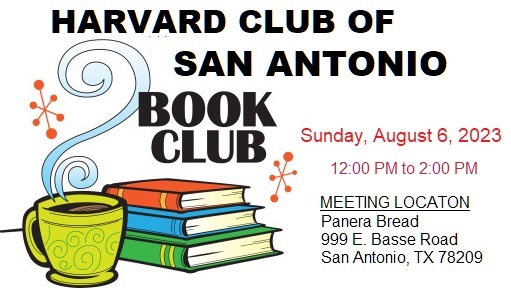
The Harvard Club of San Antonio Book Club Resumes
Sunday, August 6, 2023
12:00 PM to 2:00 PM
“The Science of Fate: The New Science of Who We Are – And How to Shape our Best Future” by Hannah Critchlow
- Sunday, August 6, 2023, from 12:00 PM to 2:00 PM. We hope to meet on the first Sunday afternoon of each month, however we try to accommodate our participants’ schedules; the first Sunday in September may not work because it’s Labor Day weekend. NOTE: our August meeting is on the same day we celebrate the College Send-Off for Class of 2027 at Stonewerks from 2 to 4, which is across the parking lot from Panera Bread. For those wishing to attend the Send-off celebration after Book Club, it is an easy walk across the parking lot.
- Panera Bread at 999 E. Basse Road, San Antonio, TX 78209. Panera Bread has counter-service featuring sandwiches, flat bread pizza, soups, salads, bagels, and pastries. They offer self-serve soda, lemonade, iced tea, coffee, and tea. We’re free to have lunch or dessert. They encourage people to hang out. We’ll pick a table and discuss our book.
- We’ll take turns choosing books for the following month’s meeting. I am recommending light fiction or non-fiction that will fit into our busy lives. Let’s pick books that everybody will want to read, or at least books that nobody will not want to read.
- We will start with “The Science of Fate: The New Science of Who We Are – And How to Shape our Best Future” by Hannah Critchlow. This Sunday Times bestseller.
- “The Science of Fate” is available from Amazon in hardcover, paperback, audiobook, and Kindle. It is also available from Daedalus Books.
- Please RSVP and let us know you will attend, procure and read the book, be ready to calmly discuss “do we have free will?”, and be ready to suggest another book for us to read.
We reformatted the first two-thirds of a cogent review on Amazon by Christopher Elstob:
Hannah Critchlow is a neuropsychologist and Outreach Scholar at Magdalene College, Cambridge. She sets out to show that ‘your future is more predictable than you think’ by drawing on scientific research – mainly from neuroscience. She enlivens her book with first-hand interviews with various researchers and thinkers, including an interesting interview with Rowan Williams, past Archbishop of Canterbury. She probes widely and tries to show how nature (modified slightly by nurture) determines much of our life and so undermines our belief in our having free will.
- She starts by talking about ‘The Developing Brain’ – in utero, as a neonate, and through the teenage years. Throughout she emphasizes how much biological determinism governs what happens, often by hardwiring pathways involving the reward systems of our brain.
- She moves on to discuss, successively, ‘The Hungry Brain’ (in which research establishes how powerful our evolutionary history has been in fixing our desire for sugary, fatty, and salty food);
- ‘The Caring Brain’ (including how our biology – through sex – drives us to love, how it determines our nurturing tendencies, and our sociability);
- ‘The Perceiving Brain’ (that underpins how each of us produces our own unique model of reality, and how it takes short-cuts that may lead to distortions and illusions, and even mental disorders such as schizophrenia); and
- ‘The Believing Brain’ (how prone we are to unconscious influences on what we believe and what fundamental values we have. In the next chapter –
- ‘The Predictable Brain’ – she explores how increasingly science is able to predict important aspects of our medical and wider future.
- This is followed by ‘The Cooperative Brain’, a chapter in which she argues that working together and using scientific knowledge we may, to some extent at least, be able to alter our fate, so gaining something akin to free will.
Throughout her book there is a (partially acknowledged) tension between, on the one hand, wanting to show that science has established that we have very little ability to make our own fate, and on the other hand wanting to acknowledge that science gives us an understanding of ourselves that, properly used, might allow us more control over our fate than we presently have.
